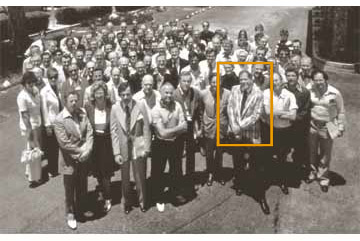| Editor’s
Note
MOVING
FORWARD
When Breast Cancer Update was originally
launched in 1988, the first person I approached for an interview
was Dr Bernard Fisher. In what was
to become a series of such discussions over more than a decade,
this research icon proved to be somewhat of a challenge when I
attempted to pin him down on treatment recommendations.
| At the time, the
initial positive reports of node-negative adjuvant trials
had been trumpeted by the NCI in an “alert” to oncologists,
but when I queried Dr Fisher about how these patients should
be treated outside |
|

Dr. Bernard Fisher and
other NSABP members circa 1980
|
a protocol setting,
he grumbled, “My first choice would be to enter them
on a trial.” I continued my pursuit by asking, “What
if the patient weren’t eligible for a study?” This
approach led nowhere. “Researchers are in the business
of doing the trials; it’s not our role to interpret the
data or tell people how to practice,” he explained. This
perspective has been |
| echoed by many
of the national and international investigators I have
been honored to interview over the years. |
All of us seek the opinions of people
who devote their careers to breast cancer research, and with time,
I have learned a bit about teasing out these perspectives in an
interview setting. One of the more interesting approaches is to
focus on the design of ongoing randomized phase III clinical trials,
which by their nature, contain an ethical imprimatur that the
investigators consider all intervention arms reasonable choices
in a research setting. In supporting the rationale for current
trial designs, investigators often provide hints concerning their
inner feelings and intuitions about where treatment is headed.
In March of this year, in an
attempt to push this concept forward, I set up a
“clinical trials” panel at the Miami Breast
Cancer Conference. We presented a series of cases to the audience
of 1,000 physicians and six investigator panelists. For each
patient, we determined via electronic interactive keypads
the usual treatment approach for such patients, and then asked
about the option of randomization into various current and
proposed clinical trials. What we learned, in essence, is
that both practicing oncologists and their research colleagues
fully understand the critical role of properly designed studies
in moving the state of the art forward. Even more interesting
is that clinical investigators have become highly adept at
identifying important research questions with randomization
arms that most doctors feel comfortable presenting to their
patients. This panel discussion and results of the electronic
keypad polling, along with expert commentary by Drs Nancy
Davidson and Monica Morrow are presented on BreastCancerUpdate.com.
A key factor in all of this is informing
physicians about the critical thinking that forms the foundation
of clinical research. It took me many years to begin to understand
how people like Dr Fisher sort through the plethora of available
trial data and form judgments on taking the next steps. The one-on-one
interviews that have been the focus of the “Breast Cancer
Update” series are intended to allow all of us to explore
the perspectives of people who devote their careers to expanding
the largest and most complex research data base in cancer medicine.
In the spirit of attempting to enhance
the success of the past, with this issue we implement two (non-randomized)
changes to our series in response to your requests: the addition
of audio CDs and a web site that is previewed in the enclosed
booklet. While casual browsing on BreastCancerUpdate.com is welcome,
the most important role of this site is to provide useful links
to abstracts and full text files of key journal articles, and
to other sites related to the topics presented on the audio program.
During a recent interview for this
series, Sir Richard Peto described, with obvious delight, the
dramatic decrease in breast cancer mortality that has occurred
over the last decade. Echoing a concept that he first presented
at the 1985 NIH Consensus Conference in a classic moment in breast
oncology, Peto explained that the key to victory in the “war”
on breast cancer is a multipronged effort that allows a series
of modest advances to eventually translate into many lives saved.
The Breast Cancer Update team is committed to playing a role in
this complex process by providing you with the most current information
delivered in a useful manner, and our hope is that the bottom
line in the future will be fewer women and their loved ones suffering
from this disease.
— Neil Love, MD
|
